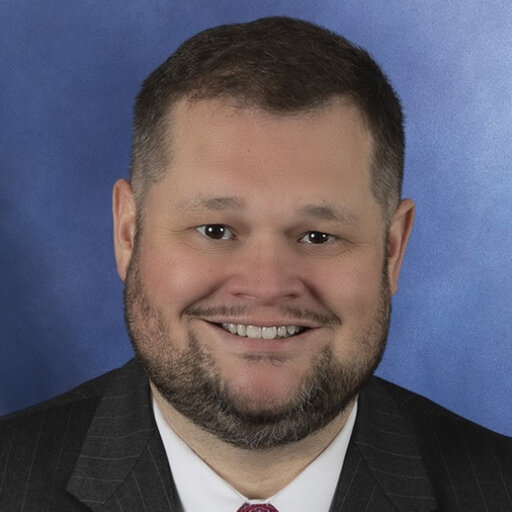Amy Sprague
August 4, 2025
The emails arrive regularly in Dallas Rosson's inbox, and they never get old. Students who entered his systems engineering course skeptical—sometimes even reluctant—reach out after graduation with a familiar refrain: they're now applying systems thinking to everything in their lives.

ISE lecturer Dallas Rosson
It's exactly the transformation Rosson hopes for when he stands before each new ISE class of professional students. As one of only 1,200 people worldwide with a Doctor of Engineering in systems engineering, he brings a rare combination of cutting-edge research and high-stakes real-world application to the classroom.
"Every single one of those people has changed," says Rosson, reflecting on his students' journeys. "They realize it's not just a work thing—it's such an all-encompassing field with broad applicability to everything in life. Systems engineering involves the structured design, integration, and management of complex systems throughout the full system lifecycle, utilizing an empirical and methodical approach, which is how many people approach personal projects, at least in part. For many, learning systems engineering and systems thinking formally brings this to light."
Bridging two worlds
By day, Rosson serves as Chief Engineer for the Undersea Systems & Sustainment Engineering Department at Naval Undersea Warfare Center Division Keyport, where he provides technical authority for a 430-person department managing everything from submarine systems to advanced laser research. His portfolio includes overseeing a $200 million cross-DoD software platform that spans all military services.
By evening and weekend, he's an ISE lecturer, teaching model-based systems engineering to graduate students who work at Boeing, Amazon, Microsoft, and defense contractors throughout the region.
"Having someone who actually worked in industry for decades teach applied classes is really beneficial," Rosson explains. "This is what the textbook says, and you need to know that for certification. But this is what you're really going to do—the meat and potatoes of how it actually works."
This dual role creates a unique classroom dynamic. "Consider me not only your teacher but your boss," he tells students. "Practice how you would report and present in industry."
The innovation challenge
Rosson's path to ISE began with a problem that affects nearly every software project: failure rates. His doctoral dissertation tackled a sobering reality—50% of agile software development projects fail, an acceptable risk for startups but potentially catastrophic for defense, healthcare, or aerospace applications.
"The DoD and government in general cannot afford that failure rate. Healthcare can't afford that. The aerospace industry can't afford that," Rosson emphasizes. "A failure could mean loss of finances at best, loss of life at worst."
His research focused on merging traditional systems engineering rigor with agile methodologies, creating what he calls "a happy medium where we can maintain engineering rigor while staying flexible to customer needs." The approach has yielded dramatic results in his DoD projects: 300% fewer defects, happier customers, and faster delivery times.
"Once people see the results—fewer defects, happier customers, faster delivery without rework—they become evangelists for the approach," he says.
Building the future
Rosson's impact extends beyond individual courses. He's developing a 599-level course on his hybrid methodology and has an upcoming textbook release. He's also working with the Paul G. Allen School of Computer Science & Engineering to offer a joint agile software systems engineering course.
The timing couldn't be better. In 2023, the Department of Defense issued a policy mandating digital engineering approaches for all major programs. "When the DoD issues that kind of directive, major defense contractors like Raytheon, Boeing, and Lockheed Martin change how they do work," Rosson notes.
Seattle's concentration of major defense and technology companies creates unique opportunities. "We're positioned to partner with them and teach what they need to achieve those goals—not just to build better systems, but to help defend our country."
Real-world application
The measure of success comes in how students apply their learning. Rosson encourages students to work on actual projects from their employers, creating immediate value for companies investing in their education. Boeing students have worked on automation challenges, while Amazon software developers have implemented the approaches in their teams after initially being skeptical about systems engineering's relevance.
The department is scaling these approaches through new offerings, including workshops for industry leaders and advanced courses. A new master's degree program launching in 2026—Master of Engineering in Leadership and Systems Analysis—will combine certificate programs with a capstone project, making graduate education more accessible to working professionals.
Converting the skeptics
Perhaps Rosson's greatest strength lies in transforming reluctant students into passionate advocates. Professional students often arrive in his courses because they're required to take them, with little enthusiasm for what they perceive as abstract concepts.
"Many students, especially in professional programs, are just trying to check a box," he explains. "I tell them that by the end of this course, they'll understand they're already doing systems engineering—it's just a new way of thinking about interconnected systems where everything affects everything else."
The transformation happens as students recognize systems thinking's broad applicability. "It encompasses project planning, financial management, architecture design, and lifecycle management," Rosson explains. "It's applicable to everything in life."
For prospective students wondering about the field's impact, Rosson offers this perspective: "The best systems engineers are curious people who know a little about everything. You get to be a decision-maker, break down communication barriers, improve efficiency, and build better systems. You directly impact people's safety, finances, and how efficiently things work."
As Seattle continues to grow as a hub for technology and aerospace innovation, Dallas Rosson is ensuring that our graduates are prepared not just to adapt to that future, but to lead it.
"We're fortunate to be at the center of major industry," he notes. "There are few places where you can have such a big impact on the global technology industry."
ISE Chair Juming Tang shares his excitement, "Professor Rosson brings real-world expertise as an industry practitioner to our professional students. His ability to connect systems engineering research with mission-critical applications gives our graduates a competitive advantage in the field."